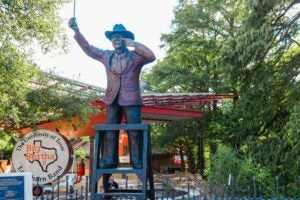Campus Kudos
ExxonMobil gives first million-dollar matching donation
ExxonMobil has given $1,002,329 to the university as a 3-to-1 match of gifts made by the company’s employees and retirees in the past year. It is the first time the company’s yearly match has exceeded $1 million after coming close in recent years. A majority of the $1,002,329 donation benefits programs in business, engineering and geosciences, reflecting the primary academic background of ExxonMobil’s personnel.
Department of Theatre and Dance appoints new chair
Dr. Brant Pope, head of the Department of Theatre at the University of Illinois, has been appointed chair of the Department of Theatre and Dance, effective June 1. Pope also has been appointed as holder of the Z.T. Scott Family Chair in Drama in the university’s Department of Theatre and Dance. Pope succeeds Holly Williams, interim chair of the Department of Theatre and Dance, who will continue in her position as professor and head of the master of fine arts in dance program.
Ransom Center awards more than 60 research fellowships
The Harry Ransom Center has awarded more than 60 research fellowships for 201011. The fellowships support research projects in the humanities that require substantial use of the center’s collections of manuscripts, rare books, film, photography, art and performing arts materials. The scholars, almost half of whom will be coming from abroad, will use Ransom Center materials to support their projects.
Dean of Social Work receives lifetime achievement award
Dr. Barbara White, dean of the School of Social Work, has received the “Significant Lifetime Achievement in Social Work Education Award” from the Council on Social Work Education (CSWE) for her achievements in social work education. White is a former president of CSWE, the profession’s primary educational organization, and also is former president of the 155,000-member National Association of Social Workers.
Electrical and Computer Engineering names new chair
Dr. Ahmed Tewfik, the E. F. Johnson Professor of Electronic Communications at the University of Minnesota, and vice president for technical directions of the Institute of Electrical and Electronics Engineers (IEEE) Signal Processing Society, has been named the new chair of the Cockrell School of Engineering Electrical and Computer Engineering Department. Tewfik’s position takes effect Oct. 1.
Freshman Research Initiative receives $1.6 million grant
The university has received $1.6 million from the Howard Hughes Medical Institute (HHMI) to expand the Freshman Research Initiative (FRI) in the College of Natural Sciences and get more first-year science students engaged in authentic research. The funding is part of a new round of grants from HHMI totaling $79 million that will help universities nationwide strengthen undergraduate and precollege science education.
Doctoral candidate wins $10,000 Granof Award
Roy Germano, a doctoral candidate in the Department of Government, has won the $10,000 Michael H. Granof Outstanding Graduate Student Award at the Graduate School/University Co-op Awards for Excellence in Graduate Education. The Excellence in Graduate Education awards recognize and reward outstanding graduate students for distinguished scholarship, research, writing and teaching.
Journalism professor receives grant to study East Austin
Mercedes Lynn de Uriarte, associate professor in the School of Journalism, has received a $150,000 grant to explore the social consequences of displacement by gentrification in East Austin. The grant is one of 119 awarded by the W.K. Kellogg Foundation this month to address the devastating impact of racial inequities on communities across the country. The foundation’s five-year, $75 million initiative — America Healing — aims to improve outcomes for vulnerable children and their families by promoting racial healing and eliminating barriers to opportunities.
Press Mentions
The New York Times: Graduates’ first job: Marketing themselves
May 21
This spring, college seniors are entering a better job market than the class of 2009 faced. Unfortunately, that is not saying much because 2009 was one of the worst years in the history of hiring.
Still, hiring of this year’s crop of graduates is up 5 percent over the previous year, according to the National Association of Colleges and Employers.
Whatever your strengths and weaknesses, you will need to “bring your A game” to this job market, said Katharine Brooks, director of liberal arts career services at the University of Texas at Austin and author of a career guide called “You Majored in What?”
BusinessWeek: BP cap waiver may be moot in light of possible lapses
May 21
BP Plc’s pledge to waive a $75 million limit on environmental damages for its Gulf of Mexico oil spill may prove an empty gesture if safety violations played a role in the disaster.
Federal and state environmental claims over damage to wetlands, waterways and wildlife are a “a huge risk” to BP and the other companies, and may cost more than lawsuits by private parties, said Tom McGarity, a law professor at The University of Texas in Austin.
“Fishermen are directly affected by the loss of a particular species,” McGarity said. “The natural resource damages claims don’t get into the worth of a species to fishermen, but to mankind.”
Forbes: ‘Modifying’ Miranda modifies political debate
May 20
Hammered for months by Republicans as soft on terrorism, Attorney General Eric Holder and the rest of the Obama administration are suddenly playing offense, offering to work with Congress on a law that would let law enforcement delay constitutional Miranda warnings to terror suspects.
The shift would give investigators greater flexibility in the critical early phases of terror investigations.
What is less clear is how a change to the public safety exception in Miranda would work and how long it could delay providing the warnings. Miranda restricts using a suspect’s answers in his criminal trial if he has not first been notified of his right to remain silent and get a lawyer.
What’s unclear now is “how far the exception extends,” says University of Texas law professor Robert Chesney.
The Wall Street Journal: Chamber attempts to put a number on energy security
May 23
The U.S. economy will face increasing risks in coming years from higher overall energy prices, bottlenecks in electricity transmission and higher oil costs, according to a new study.
The study, by the U.S. Chamber of Commerce’s energy-policy group, is slated to roll out this week with the aim of producing a data-driven definition for the politically hot term “energy security,” which has bedeviled energy-policy debate.
“People who panic about energy security believe that markets can’t work. People who are much more sanguine…. say ‘If I need it I can get it in the global energy market,'” said Michelle Foss, an energy economist with the University of Texas. Renewable-energy sources may be less vulnerable to disruption by wars or boycotts, but they also may be less reliable, she said.
Foss advised the Chamber, which represents more than three million businesses, on its index.
Read last week’s In the Know.



